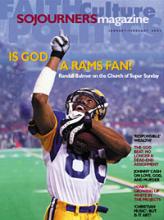My, how time flies. It's been 30 years, more or less, since Larry Norman provided the sonic backdrop for the Jesus Movement, radically merging rock melodies and instrumentation with scriptural content, proving to all but a few kooks that rhythm and syncopation and electric guitars are not the devil's exclusive domain. Yet what passes as Christian music today feels oddly safe, even boring. What happened?
Three recent books attempt to answer that question, chronicling the emergence and critiquing the status quo of the trademarked phenomenon known as Contemporary Christian Music or CCM: Mark Joseph's The Rock & Roll Rebellion, Charlie Peacock's At the Crossroads, and Jay Howard and John Streck's Apostles of Rock. That's a lot of ink, a combined 834 pages, devoted to a musical format that many assiduously avoid while scanning the radio dial.
Taking different approaches, the authors nonetheless share a common assessment. What Norman and scores of other artists pioneered has since morphed into a behemoth, an industry that rings up nearly $1 billion a year catering to the evangelical bookstores that speckle the strip-mall landscape of the suburban marketplace. The notion that Christian artists could use their talents to challenge the dominant culture has given way to a musical genre that is all too content to carve out its niche among converted middle-class consumers eager for edification and encouragement.
Joseph's Rock & Roll Rebellion takes the harshest tone of the three and is the weakest of the lot. He begins with a poorly chosen metaphor, the Negro baseball leagues, in which great talent traversed the bush league backwaters, consigned to asterisks in the record books and posthumous Hall of Fame recognition. Joseph claims CCM is a similar ghetto, that believing artists have been forced to ply their craft in isolation from the mainstream, to the great economic boon of the CCM business elite.
Read the Full Article
